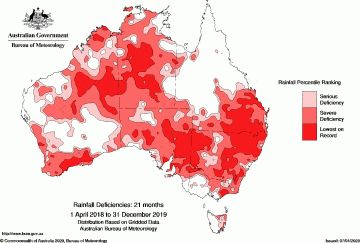Claire Lehmann in Quillette:
 In 2019, short-term weather fluctuations in the Indian Ocean—the Indian Ocean Dipole, as scientists call it—pushed moist ocean air away from Australia’s shores, causing a severe drought, and drying out the leaves, sticks and soil on the bush floor.
In 2019, short-term weather fluctuations in the Indian Ocean—the Indian Ocean Dipole, as scientists call it—pushed moist ocean air away from Australia’s shores, causing a severe drought, and drying out the leaves, sticks and soil on the bush floor.
This has come in tandem with unusually strong and sustained winds associated with a separate phenomenon known as the Antarctic Oscillation, which have pushed fires in all directions, turning isolated local crises into regional disasters. And of course all of this comes amid a steady increase in average temperatures across Australia, a phenomenon that climate scientists have warned us about for decades. They also have correctly predicted that long-term climate-change trends will increasingly interact disastrously with short-term climate phenomena in a way that catalyses and exacerbates extreme weather events.
Unfortunately, successive Australian governments have failed to adequately heed these warnings. A more aggressive use of controlled burns might have given firefighters a chance to control this season’s bushfires. But, as has been the case in other nations, climate policy in Australia has been mired in partisan politics, with both sides using the issue to score points instead of implementing sensible and pragmatic policies.
More here.
